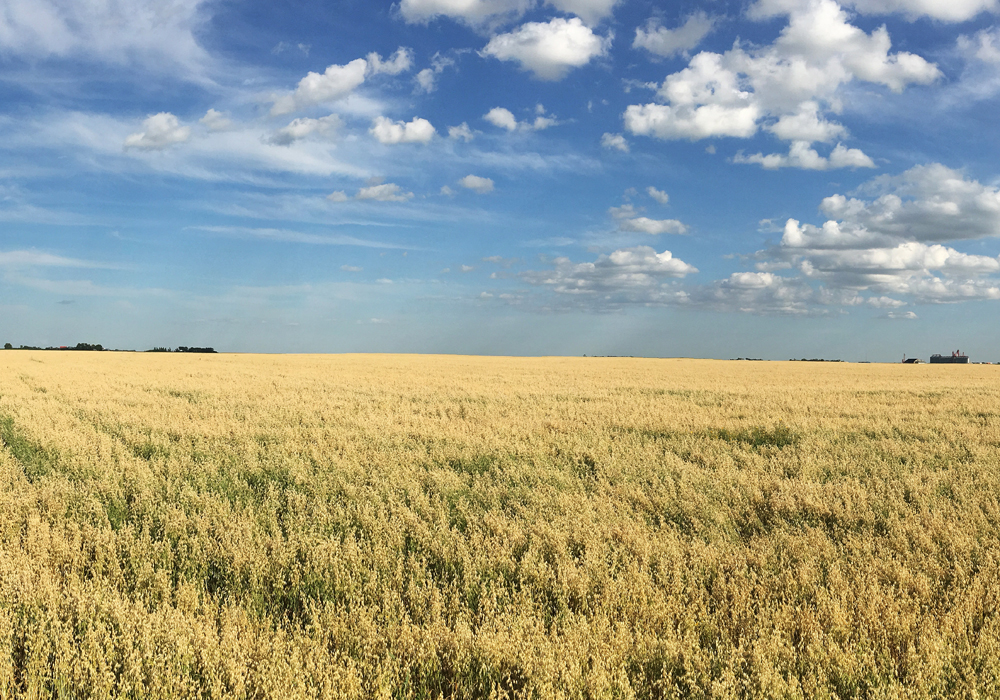UPDATED – August 26, 2019 1445 CST – This story has been updated with the addition of comments from John Wiebold, vice president, North American direct material sourcing at General Mills.
“We are working to reduce the need for synthetic pesticides”: General Mills.
Over the last five years, or so, General Mills has committed to sourcing its major ingredients, like oats, wheat, sugar, from farmers who follow sustainable practices.
But now, the maker of Cheerios and Nature Valley granola bars is taking a further step — it is encouraging its suppliers (farmers) to cut their use of pesticides.
Read Also

Farming Smarter receives financial boost from Alberta government for potato research
Farming Smarter near Lethbridge got a boost to its research equipment, thanks to the Alberta government’s increase in funding for research associations.
“Recognizing that synthetic pesticides may harm beneficial insects including pollinators, or drift beyond a farmer’s field, affecting nearby fields and ecosystems, we are actively working across our value chain to limit these unintended and potentially harmful impacts,” General Mills says on its website. “We have strategies in place to reduce synthetic pesticide use, and we work with trusted agronomists and other experts to implement continuous improvement practices throughout our supply chain.”
As You Sow, a non-profit that promotes corporate responsibility, is partly responsible for General Mills’ decision to cut pesticide use.
“By this action, General Mills is stepping up as a leader among its peers. The company has explicitly stated its intention to reduce the use of synthetic pesticides on supplier farms,” As You Sow said mid-August, in a news release.
Last year As You Sow led a shareholder initiative, pressuring General Mills to disclose what it’s doing about pesticides.
About 31 percent of shareholders asked the company to share “available quantitative metrics on pesticide use in the Company’s supply chain”, because pesticides were “exposing (General Mills) to brand damage.”
The shareholder resolution focused mostly on the use of neonicotinoids, a class of insecticides that may be a threat to pollinators. But other pesticides could also represent a threat to the General Mills’ brand.
In January, CBS News ran a story with the headline: “Cheerios, Nature Valley cereals contain Roundup ingredient, study finds.”
Glyphosate, the active ingredient in Roundup, is applied to oats before harvest on many farms in Western Canada. Tiny amounts of glyphosate residue, in parts per billion, have been detected in oatmeal and other oat-based foods. General Mills buys most of its oats from growers in Manitoba and Saskatchewan.
The General Mills pesticide reduction strategy, posted on its website, doesn’t specifically mention pre-harvest use of glyphosate.
However, an oat grower in Manitoba’s Red River Valley told The Western Producer that General Mills is taking action on glyphosate.
He said farmers who are part of the company’s sustainability program are not allowed to use pre-harvest glyphosate.
The Western Producer contacted General Mills for a response to clarify this situation.
“General Mills has activity going on in Canada in different regions where we source oats. We are experimenting with contract grown oats in some of those areas,” said John Wiebold, vice president, North American direct material sourcing at General Mills.”
“In some cases, the same farmers are being approached to work on regen ag and to supply General Mills with oats grown on contract through our suppliers. When we’ve experimented with contracts, we’ve asked the farmers not to apply glyphosate because we want to understand our ability to source oats without that pesticide applied to oats.”
The General Mills website says it is employing four strategies to reduce pesticide use in its supply chain:
• encouraging regenerative agriculture;
• promoting Integrated Pest Management (IPM);
• expanding organic acreage;
• promoting pollinator health
A General Mills spokesperson said none of these efforts are new.
“What is new is several areas of measurement, results and reporting,” said Mollie Wulff. “For instance… under strategy three (organic) we’ve listed our pounds of pesticide use avoided per year since 2015. As part of our effort to expand the broad understanding of pesticide use, in fiscal 2017, we commissioned an analysis by the IPM Institute of North America to specifically assess the scope of IPM adoption and pesticide use throughout our North American supply chains for five major crops: corn, oats, soybeans, sugar beets and wheat.”
Earlier this year General Mills announced a goal of increasing regenerative ag practices to one million acres by 2030. The practice, which includes use of cover crops, diverse crop rotations and other strategies, could be a key part of the company’s pesticide reduction plan.
“Among its many benefits, regenerative agriculture suppresses pests by promoting natural competition to significantly reduce the need for synthetic pesticides,” its website says.
General Mills is working with 45 farmers, mostly in Manitoba and Saskatchewan, coaching the producers on regenerative practices. The company is measuring a number of outcomes from regenerative agriculture, including pesticide use.
Factoid: General Mills is an organic powerhouse
In 2018, General Mills is the second largest producer of organic and natural food in the U.S. That year, the company reached 200,000 acres of organic production and hopes to expand its organic production to 250,000 acres in 2019. (Source: General Mills)
Contact robert.arnason@producer.com


















